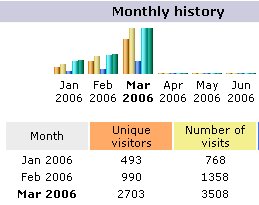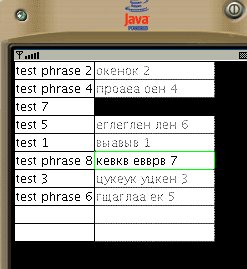Per aspera ad astra - what does it mean? It means "through difficulties to the stars" in Latin. Doesn't it describe the human's life now as much it described it two millenia ago?
Time has come. Classic is eternal. Our ancestors weren't stupid - they learnt Latin and knew that this knowledge isn't just some freaky eccentricity. And today we are proud to announce that
zhukant has completed translation of a full set of Latin lessons. This invaluable contribution is going to be remembered for all ages ahead - now not only students from coutries with Latin-based languages will be able to learn this beautiful and elegant language. No, now students with native languages of all language groups - Slavik, Hindi, Chinese, Japanese - all of them will be able to learn Latin words with
Internet Polyglot.
Thanks to
zhukant again - this is an enormous addition to the site.
Now please be cordially invited to
Free Online Latin Lesson to Increase Your Latin Vocabulary.
P.S. I hope you didn't forget that "
English-Latin Dictinary" should be written as "
English-Latin Dictionary"? Hehe, :))
The root of civilizationThe Roman Empire is considered by many historians as the cradle of modern civilization and one of the most invaluable reagents in European culture. As with most hegemonies, the Roman Empire could only survive and prosper by extending its reach and civilizing new places, a process often called “Romanization”. This Romanization was done with the help of the Latin language, which was used at that time for commerce, international affairs and so forth.
Although born around the foothills of Rome, the Latin language quickly spread throughout neighboring city-states and eventually became the official language of the area. At its peak, the Roman Empire stretched from the Middle East all the way to the Iberian Peninsula and at least in its western part, the language was established so well that its roots remained solid even after the Empire fell, allowing new languages based on Latin to form up.
The use of Latin as the official language of the Catholic Church later on was also decisive in increasing its role in Europe and making it a language that stood the test of time even though the Empire that used it fell. There was a time when a person could simply not have been regarded as a true
polyglot unless his repertoire included the Latin language.
Even though the Latin language is nowadays widely considered to be an extinct language, since the number of fluent speakers is extremely low (and there are no native speakers either), it has applied a major influence on many other languages that are still thriving. In addition, the Latin language is primarily used in fields such as science, academia, and law.
Learning LatinLearning Latin is a double edge sword in what regards the ease with which you can practice it. On the bright side, the rules of the Latin language are quite structured and very easy to follow and understand. Every
“Learn Latin” course in the world will start by stating this fact. However, the ease with which Latin can be learnt is hindered by the lack of good teachers. Since it’s not a spoken language per say and there are no native speakers that could teach, Latin teaching is left in the hands of persons that studied it rigorously but might still not be able to judge the language as a native would.
An alternative you could take is to try and take some
free Latin lessons online. Although learning off the Internet is not comparable to learning with a tutor or in class, it’s still a great way to start off the learning process. Once you’ve zeroed in on the major grammar rules and learnt a few sentences it’s time to
improve your vocabulary. This can be done by either reading a lot of texts in Latin (it might not be the case at this point though) or playing some
vocabulary games such as puzzles, quizzes and so forth. These help you
memorize words quicker and will prove to be quite an importance
vocabulary increase.
Articles about Latin in other languages:Latin: The Root of Civilization (in English)
Lengua latina (in Spanish)
Langue latine (in French)
Lateinische Sprache (in German)
Lingua latina (in Italian)
Latijnse Taal (in Dutch)
Истоки цивилизации (in Russian)
Língua Latin (in Portuguese)
جذر الحضارة (in Arabic)
Latina – radacina culturii si a civilizatie Romane (in Romanian)





